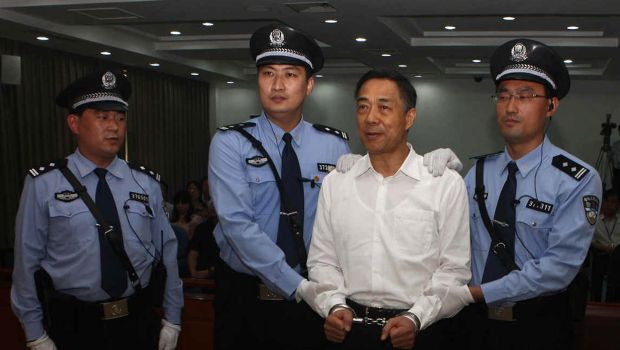
Ousted Chinese politician Bo Xilai is handcuffed after the announcement of his verdict inside the court in Jinan, Shandong province September 22, 2013, in this photo released by Jinan Intermediate People’s Court. (Reuters/Jinan Intermediate People’s Court)
The former Politburo member and Chongqing city party leader was convicted of bribery, embezzlement and abuse of power in a case set in motion by his wife’s poisoning of a British business associate, but also widely regarded in China as a prosecution that was carried forward because the charismatic, publicity-seeking populist had lost support of top leaders.
The Jinan Intermediate People’s Court also deprived Bo of political rights for life and confiscated all his personal assets, effectively ending his political career. Although Bo could appeal the verdict, he was widely expected to have little chance of success.
“It’s a political death sentence for him,” said Dali Yang, a political scientist at the University of Chicago. “As long as the current circumstances stay, he cannot come back.”
In a marked departure from the closely choreographed proceedings of other recent political trials, Bo had launched an unusually vigorous defense while on the stand last month. He denied all charges and blamed the corruption on others in his inner circle, thus forgoing the leniency customarily given in Chinese courts when a defendant expresses contrition.
The charges had likely been tailored to offer a lighter sentence had Bo cooperated with prosecutors, but he declined to play along, said Willy Lam, an expert on Communist Party politics at Chinese University in Hong Kong.
“He was punished for his disobedience and defiance,” Lam said.
Bo also became the highest-level politician convicted for corruption under China’s leader Xi Jinping, who has staked his reputation on combating graft among Communist Party members and cleaning up their image of luxurious lifestyles that have angered the Chinese public.
“The leadership wants to send a signal that this is a serious matter,” Yang said.
According to details of Sunday’s proceedings released by the court in Twitter-like posts, Bo was escorted into the courtroom by marshals and stood to listen as the judge read out the lengthy verdict. He had crew-cut hair and wore a white shirt and black pants, and gave a slight smile.
The court sentenced Bo to life in prison on the bribery charges, 15 years for embezzlement and seven years for abuse of power.
The court rejected Bo’s defense that he did not know about the USD 3.5 million in bribes from two business associates in the form of cash and valuable gifts to his family — including a French villa, expenses-paid trips, an electric scooter and fancy delicacies such as abalone. However, the court said a small portion of the bribes alleged by prosecutors, of about USD 160,000 were not proven in court.
The court also found that Bo embezzled USD 160,000 from a secret government project in the northern city of Dalian.
The trial proceedings had been publicized through partial transcripts that gave a measure of legitimacy to a trial seen by many observers to have a foregone conclusion of guilt because of the Communist Party’s tight control over the court system.
“This is a big victory for Xi Jinping’s leadership, because you cannot say this is a secretive trial. It is at least a semi-open trial,” said Li Cheng, an expert of elite politics at Brookings Institute. “Bo’s political career is zero, and the trial really transformed Bo from a charismatic leader to a self-indulging person.”
Han Deqiang, a Beijing university professor and a supporter of Bo, expressed his disappointment with the verdict, saying it negated Bo’s policies aimed at narrowing the wealth gap in China.
“If the gap continues to widen, the left will only become stronger,” Hang said. “He has no chance to come back under the current political system, but how long can the current political system last? Then, he may have a chance.”
Bo is still widely popular in the regions where he served, especially in Chongqing where he was party chief from 2007 to 2012. He spoke often of better distribution of wealth from China’s economic growth and introduced housing reforms and other social policies that were welcomed by the poor in Chongqing.
Bo’s downfall was set in motion in February 2012 when his former top aide attempted to defect to a US consulate with information about his wife’s murder of British businessman Neil Heywood, just as leaders were preparing a once-a-decade leadership transition.
Bo had been seen as a contender in the transition for China’s top leadership panel, the Politburo Standing Committee, but he also had unnerved many colleagues in the leadership with self-promotion seen as running counter to their brand of consensus rule.
Prosecutors later accused Bo of interfering with the probe into the murder, as well as unrelated corruption uncovered by investigators. Bo’s wife, Gu Kailai, confessed to the murder and was handed a suspended death sentence last year that will likely be commuted to life imprisonment.
